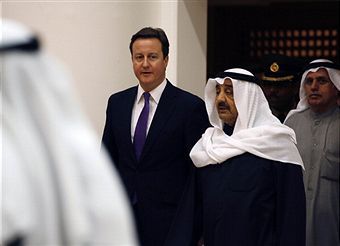 Daniel Finkelstein makes a simple but important point in the Times today (£): a Prime Minister’s foreign policy is determined by events more than by
instincts. The revolts in the Middle East are defining David Cameron’s diplomacy.
Daniel Finkelstein makes a simple but important point in the Times today (£): a Prime Minister’s foreign policy is determined by events more than by
instincts. The revolts in the Middle East are defining David Cameron’s diplomacy.
The emerging policy is a realistic expression of Britain’s current domestic and international capabilities. Cameron’s speech to the Kuwaiti parliament did not match Harold Macmillan’s ‘winds of change’ speech because Britain no longer disposes of continents. Likewise, Tony Blair’s messianic tendencies belong to a past era. Colonel Gaddafi’s murderous stream of conscious could have given cause to evoke the moral certainty of an ‘ethical foreign policy’. Cameron still empathises with Blair’s cause in Iraq, but he concedes that that liberal interventionism has been degraded by its legacy. Besides, Western powers no longer have the military capability or the political will to execute such missions. Nor does Britain have the muscle or inclination to stand by ‘friendly despots’ when the oppressed are resisting.
To a very great extent then, Cameron’s hand was forced. But, nonetheless, he marked his own ground. He may admire Garibaldi’s principled ambition, but this was the speech of a conservative neo-conservative. He appealed to liberty and democracy, rejecting the conceit that Arabs are inimical to progress, in the Whiggish sense of the term. That he is the first global leader to have done so is a sign of his determination and perhaps another indication of that often rumoured sense of tempered paternal duty. Bound within the precincts of the possible and using consensus rather than superiority, Cameron hopes to influence global affairs, not shape them.






Comments